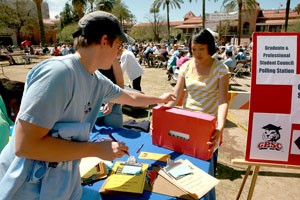The GPSC expects a new year fraught with fresh blood as its elections continue through tomorrow.
Only three positions – the vice president and two representative seats – are up for grabs, compared to eight last spring.
Voting, which is restricted to graduate students, is available at gpsc.arizona.edu/elections. The polls close tomorrow at 5 p.m.
Graduate and Professional Student Council President Catherine Neish said the fewer competitions this year may be due to a combination of a “”breakdown in communication”” between the council and its constituents, and a glut of outgoing members, who may not have been as aggressive in tabbing successors as in previous years.
“”We’ve got a lot of new kids on the block,”” Neish said of next year’s council. “”We’ll see how they do.””
Boris Glebov and David Talenfeld vie for vice president. Glebov is the council’s representative for the College of Optical Sciences.
Glebov, a doctoral student in optical sciences, said he intends to emphasize the passage of a drafted graduate and professional student bill of rights and responsibilities Neish has spearheaded this year.
His other foci as vice president would include making sure the UA appropriately benefits from the Arizona Students’ Association’s recently approved $1 per-semester fee increase, as well as boosting pay for teaching assistants.
“”I’ve been doing student affairs at different levels for a few years now; I guess I realized I couldn’t give it up,”” he said. “”I wanted to continue my work. An opportunity came up to step up my participation.””
He said he plans to work with the GPSC through his college even if he is not elected.
Talenfeld, a first-year law student, said he’s primarily concerned with what he called “”quality-of-life issues”” for graduate students that, in turn, affect how competitive the UA is in attracting them.
He wants to ensure financial aid and student salaries stay in keeping with inflation, as well as bolster health insurance coverage GPSC installed this year.
He also wishes to establish campus-wide child care and a maternity-leave policy.
“”I really like working for people,”” Talenfeld said. “”I thrive on challenge, and I like to keep busy. I feel I can make a contribution.””
Eirin Bareis and Jed Laver compete to represent the College of Architecture and Landscape Architecture in a new position.
Laver, an architecture graduate student, said the lack of a would-be predecessor was his primary reason for running.
“”I felt I wanted to step up,”” he said.
He aims to get students involved with the workings of the university and engineer a “”modest pay increase”” for teaching assistants to pay for housing and to accommodate new and incoming students.
Bareis, a landscape architecture graduate student, could not be reached for comment by deadline yesterday.
Her online platform states that she seeks to build relationships between her college and the university, diversify sources of research funding and match teaching assistant pay to workloads.
Erica Cirillo-McCarthy, a doctoral student in rhetoric, composition and the teaching of English, faces Errol King, a doctoral student in Spanish, for the College of Humanities’ seat.
Cirillo-McCarthy plans to advocate for activities to accommodate students’ families, decrease students’ teaching loads and maintain a 100 percent tuition remission, a rate the college achieved for the first time this year.
Tuition remission refers to the amount of tuition a college pays for while students teach.
King wrote in an e-mail that he also supports Cirillo-McCarthy’s latter two missions, as well as better insurance coverage for graduate students and pay equivalent to teaching workload.
“”In order to bring about changes, the GPSC has demonstrated the need of better benefits for graduate students if our Graduate College wants to stay competitive,”” he wrote.
Stephen Bieda, a doctoral student in atmospheric sciences, will assume the presidency unopposed, marking the third instance in as many years in which the president has been selected at-large, Neish said.
She hopes Bieda will continue her major projects from the past months, including efforts to establish an on-campus child care center and the bill of rights and responsibilities.
The 15-page document is poised to be rewritten following feedback received from administrators such as UA President Robert Shelton and Melissa Vito, vice president of student affairs, Neish said.
Andrew Comrie, dean of the Graduate College, has worked extensively with Neish to forge the bill’s content, she said.
Over the past month, Neish has taken Bieda – who will assume office the first weekend of May – to meetings regarding the bill to get him up to speed and ready him to see it through to completion next year, she said.
She called the presidency, with its time commitments equivalent to a “”part-time job,”” an extremely demanding task for a graduate student, adding that if Bieda can overcome that hurdle, “”more power to him.””
Bieda could not be reached for comment by deadline yesterday.










